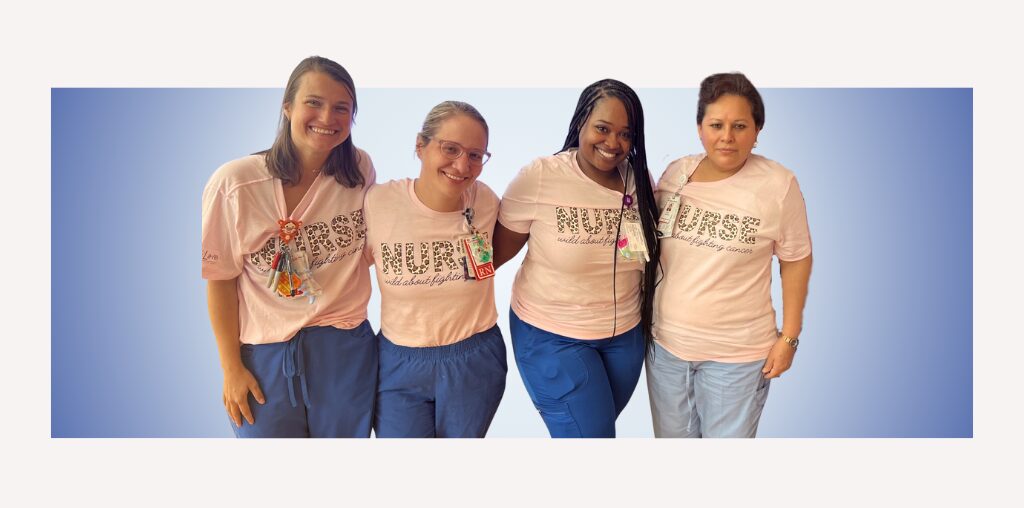Stepping into Pediatric Hematology-Oncology Nursing: What to Expect and How to Prepare
If you’re an experienced nurse considering a transition into pediatric hematology-oncology nursing, you likely already understand that the role requires both clinical precision and emotional strength. At Texas Children’s Hospital, this specialty offers a unique opportunity to make a lasting difference in the lives of children and their families, whether you’re supporting a newly diagnosed patient, administering life-saving treatments, or celebrating milestones together.
As one of the largest pediatric cancer and blood disorder programs in the country, Texas Children’s Cancer and Hematology Center is home to dozens of dedicated pediatric hematology-oncology nurses who bring knowledge, compassion, and resilience to every shift. If you’re curious about making the leap into this field, here’s what to expect and how to prepare.
What Makes Pediatric Hematology-Oncology Nursing Different?
Clinically, pediatric hematology-oncology nursing involves caring for patients with complex diagnoses and high acuity. Our nurses monitor critical side effects, administer chemotherapy and biotherapy, and manage central lines and blood products, all while adapting to the developmental needs of children ranging from infants to young adults. Expanded roles at Texas Children’s include charge nurses, central line nurses, preceptors, nurse instructors, as well as PACU nurses and procedure nurses.
Emotionally, the work is intimate and often long-term. Nurses build strong relationships with patients and families, offering consistency through what can be a long and uncertain journey.
“I think the biggest adjustment moving from adult to pediatric care was communication,” says Mel Stephens, an inpatient nurse who transitioned from adult medical-surgical nursing. “In adult care, patients can usually tell you exactly what’s wrong. In pediatrics, especially with younger kids, you sometimes have to figure it out. On top of that, you’re communicating with parents who are scared, especially if it’s their child’s first hospital stay. But that’s where we come in—to be a source of light and help them navigate this journey.”

The Role of the Family in Pediatric Cancer Care
One of the defining characteristics of pediatric hematology-oncology nursing is the emphasis on family-centered care. Nurses don’t just treat the child; they support and partner with families in meaningful ways.
“A lot of nurses coming from adult care are nervous about having to work closely with parents,” says Ashley Makara, an inpatient nurse educator. “But our families are actually a huge asset. They know their kids better than anyone. If something feels off, they’re usually the first to notice. We encourage nurses to use that knowledge as a resource. Families here are incredibly engaged and knowledgeable.”
Common Misconceptions and What to Expect
A common misconception is that pediatric hematology-oncology nursing is all about chemotherapy infusions and bell-ringing ceremonies. While those joyful moments do happen, they are only one part of the picture.
“At first, I thought it was just going to be patients coming for chemo, and we’d be ringing bells all the time,” Mel admits. “But I didn’t fully understand how deeply involved we are in every part of their care. We’re educators, advocates, and emotional support. We help guide families through some of the most difficult days of their lives.”
Transitioning from Other Specialties
Not all nurses come into pediatric hematology-oncology nursing with previous experience in pediatrics or oncology—and that’s okay. At Texas Children’s, many nurses come from adult care, surgical units, or other specialties, and they receive comprehensive onboarding to support the transition.
“We provide everything they need,” says Ashley, “including PALS, chemotherapy certification, and central line training. What matters most is their willingness to learn and their ability to care for complex patients.”
New hires complete a two-day APHON chemotherapy and biotherapy course, participate in weekly simulation labs, and attend a four-part core curriculum led by seasoned nurse educators and outpatient coordinators. Resources like preceptor support, nurse instructors, and an orientation roadmap help new nurses progress with confidence.
Essential Skills for Pediatric Hematology-Oncology Nurses
Success in pediatric hematology-oncology nursing relies on a blend of clinical competency and human connection. The most effective nurses share these qualities:
- Strong communicators who collaborate well with interdisciplinary teams and families
- Detail-oriented clinicians with the ability to manage complex treatment protocols
- Patient advocates who listen carefully and act with compassion
- Lifelong learners committed to staying current with new therapies and research
- Emotionally resilient caregivers who can remain steady through both celebration and loss
Certifications such as CPHON (Certified Pediatric Hematology Oncology Nurse) and participation in professional organizations like APHON and the Children’s Oncology Group (COG) are highly encouraged—and supported.

Voices from the Field: What Keeps Nurses Here
For many nurses, the rewards of pediatric hematology-oncology nursing come in quiet, powerful moments of connection.
“One of the most meaningful moments I’ve had was sitting with the mother of a child at the end of life,” says Mel. “She told me about who her daughter was before her illness. She trusted me with those memories. It reminded me why we do this—for the great days, the hard days, and everything in between.”
Nurses also describe Texas Children’s as a place where support and teamwork are more than buzzwords.
“The culture we’ve built together is one of mutual respect, support, and a genuine sense of family,” explains April Robinson, an outpatient infusion room nurse. It’s easy to ask for help knowing you’ll always be met with kindness, encouragement, and teammates who are ready to support us however they can.”
Inpatient nurse Carolina Fuentes agrees, adding: “The teamwork here is like no other. From doctors to nurses to PCAs, we all work together to provide the best care possible.”

Why Choose Texas Children’s for Your Career?
Texas Children’s supports pediatric hematology-oncology nurse education, offering a place to grow and be supported. Nurses in the Cancer and Hematology Center benefit from:
- A comprehensive training and development pathway
- Opportunities for expanded roles and leadership
- On-unit simulations and team-based learning
- A deeply rooted culture of respect, teamwork, and psychological safety
As Sara Bennett, Patient & Family Education Specialist, puts it: “It can be emotionally and physically demanding, but it is the best job in the world. Our patients are strong, resilient, and worth every bit of effort we put forth.”
Start Your Journey in Pediatric Hematology-Oncology Nursing
Whether you’re transitioning from adult care or exploring a new chapter in your nursing career and want to be part of a team that truly makes a difference, pediatric hematology-oncology nursing at Texas Children’s may be your calling.
Search our careers to learn more and explore current openings in the Cancer and Hematology Center.





